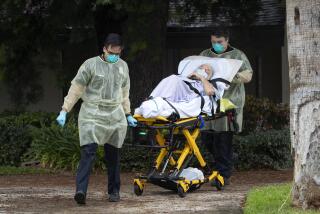Editorial: Don’t use coronavirus as an excuse to lower California’s medical care standards
- Share via
In the midst of the coronavirus emergency, hospitals, nursing homes and other healthcare providers want California Gov. Gavin Newsom to use some of his extraordinary power to sweep away their liability for substandard care and bad decision-making.
They claim to need broad immunity because the pandemic requires them to divvy up limited lifesaving equipment and care. If they are to save as many lives as possible, they argue, they need to know they will not be second-guessed by criminal and civil juries some years after their heat-of-the-moment decisions to prioritize the care and resources available — for example, by selecting which critically ill patients should get ventilators and which should not when there aren’t enough to go around.
It is certainly true that front-line doctors, nurses and other medical workers are under pressure. We rely on them to meet high standards of care.
So why would we lower those standards now?
That’s essentially what six medical trade and professional associations are seeking. Even though California already has a statute guaranteeing no liability for patient injuries that result from care given during a declared state of emergency, they are asking for even broader immunity. Not being held financially or criminally responsible for meeting a standard of care has the same effect as lowering that standard.
The associations’ request is a companion piece of sorts to a set of triage guidelines drawn up, with their input, by the Department of Public Health last month. The document was later withdrawn and re-released as a draft that recommends prioritizing patients not just by whether medical care can help them, but by extraneous factors such as how many more years they can be expected to live after full recovery.
That approach discriminates not just against seniors, but also against societally marginalized groups. Because of a host of inequities, African Americans and people with less education and fewer economic opportunities have received poorer healthcare throughout their lives and therefore are projected not to live as long as their wealthier and whiter counterparts. Dividing up emergency care by projected life span perpetuates the inequity.
The medical associations sent Newsom a letter on April 9 seeking extraordinary immunity for their triage decisions.
But the immunity would apply as well to any negligent or even reckless treatment decisions. It would apply to nursing homes and elder care homes, many of which have a long history of providing poor levels of care to their patients in the interest of cost savings. A nursing home that failed to establish or follow sound procedures to prevent the coronavirus from entering the facility and then spreading could have absolute immunity for its substandard controls.
Lax infection controls could easily affect staff as well as patients, and by extension the families, friends and neighbors of staff or visitors. A recent Times article told the story of Brittany Bruner-Ringo, a nurse at upscale dementia care home Silverado Beverly Place. Relatives of Bruner-Ringo said she told them she had been instructed by her supervisors to admit a man who’d just arrived from New York City — a hotbed of infection — exhibiting tell-tale symptoms of the extremely communicable disease, even though the facility was supposed to be locked down.
The nurse was one of more than 60 residents and workers at the facility who subsequently contracted the disease. She died on April 20. (Operators of the facility’s parent company disputed the family’s version of events.)
It would not be unusual for survivors to pursue legal action for improper care, and the prospect of such lawsuits is part of the legal framework of incentives and risk management that encourages medical facilities to adhere to responsible practices (although the Times story reported that the nurse’s mother was not considering legal action). The threat of liability helps guard against elder abuse and mistreatment of patients at their most vulnerable.
Basic laws of negligence already require that extenuating circumstances be taken into account when determining liability. And California Government Code 8659 already shelters providers from liability during a declared state of emergency. An executive order to grant even more sweeping immunity could hold providers harmless for wrongful acts that injure or kill patients and possibly others, such as nurses.
Lawsuits by front-line healthcare workers might be the greater worry for nursing homes and hospitals, in part because the state has insufficient face masks and other personal protective equipment. Thanks to the state’s aggressive efforts to slow the spread of COVID-19, the number of patients needing ICU beds and ventilators has not overwhelmed the state’s healthcare system, as some early projections had warned.
Immunity from lawsuits could alter the way medical centers and nursing homes treat their patients and their workers. That’s not the kind of immunity Californians need during the COVID-19 pandemic, and it’s not the kind of gubernatorial order that protects the public. Newsom should give this one a pass.
More to Read
A cure for the common opinion
Get thought-provoking perspectives with our weekly newsletter.
You may occasionally receive promotional content from the Los Angeles Times.










